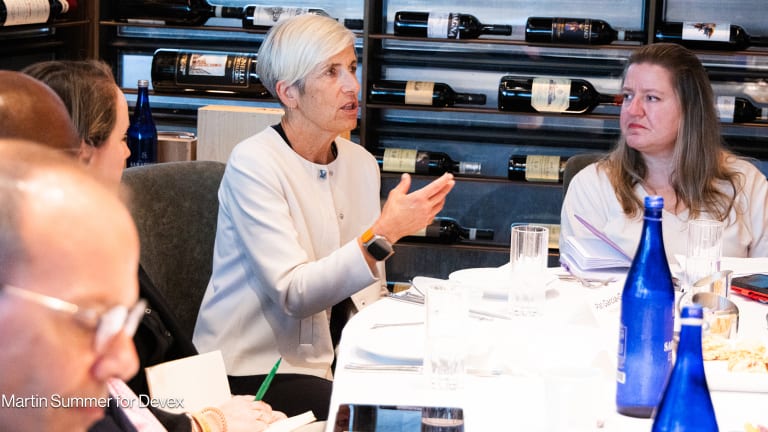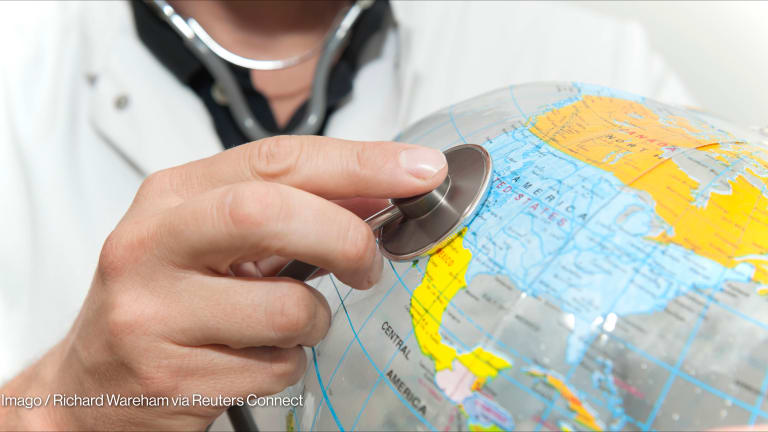
In his 2013 State of the Union Address, U.S. President Barack Obama set forth a vision for achieving what would be one of the greatest contributions to human progress — eliminating extreme poverty.
There are many ways in which the global health community can contribute to this bold vision. The U.S. government has honed in on two goals that we know are within reach, achievable and sustainable, and has fully aligned with the U.N. Millennium Development Goals 4, 5 and 6 — ending preventable child and maternal deaths by 2035, and ensuring an AIDS-free generation. Protecting human life and health is one of the best ways to eliminate extreme poverty.
As a global health community, we have the skills and know-how to accomplish these goals, but we must work together and recognize that the ‘secret ingredient’ that binds all of our collective knowledge, skills and interventions is a strong health system. The Lancet Commission on Investing in Health reported this past year that such goals are indeed feasible and would bring about a grand convergence in life expectancy between poor and rich nations in our lifetime. The required investment would pay off 9 to 20 times in full-income returns, and to succeed, half of the resources should be used to strengthen health systems — from human resources to better governance of the sector’s public and private components.
As an experienced public health physician and former managing director at the Rockefeller Foundation, where I led its global health strategy on the transformation of health systems, I firmly believe that U.S. and host-country investments in health systems strengthening and integration of services will further accelerate an end to child and maternal deaths. In fact, USAID restructured its Bureau for Global Health in 2012 and created the Office of Health Systems. This new office not only works across all of our technical areas — from nutrition and family planning to malaria and HIV/AIDS — but collaborates with multilateral and bilateral partners to address age-old barriers related to building strong health system infrastructure.
But let’s first clarify what we mean by strengthening health systems. To deliver quality health care, we must look through multiple lenses — those of the host government, the health practitioner, the community health worker and, most importantly, the patient. From the perspective of our host government partners, determining how to finance universal health coverage so that essential services are accessible to everyone and no one is thrown into deeper financial hardship because of a catastrophic event is a growing priority. Both the World Health Organization and the World Bank have prioritized UHC as the new frontier for global health and the way to ensure primary care with equity, efficiency and quality. Furthermore, in order to create an enabling environment for UHC, it must be a political priority for the host country, both in word and deed. Increases in country-level investments to augment donor investments will be a critical component for long-term sustainability, and this will be possible in a growing number of countries that are moving from low-income to middle-income status.
From the point of view of a health practitioner, their ability to deliver quality health care is dependent on how well they are trained, and whether they are stocked with proper supplies and equipment, have decent working conditions, and have a manageable workload. Improving medical record-keeping and receiving timely and reasonable pay are also critical components, and we can look to using technology in innovative ways to help the developing world leapfrog to more advanced systems, while simultaneously building deeper partnerships with academia and professional associations to train health practitioners.
Faith-based volunteers and community health workers are the “engines” of health systems in much of the developing world, and are a tremendous asset, as they connect the patient to the system. They are often the patient’s first point of contact, and play an important role in diagnosing, counseling and triaging what level facility a patient should be sent. With incentives and proper training, they can counsel a pregnant woman to go to her antenatal care visits, ensure that she gets proper nutrition, and is tested and treated for her HIV, and help her arrange transportation prior to delivery at a health care facility by a skilled practitioner — all important steps in preventing newborn and maternal deaths.
Then there are the patients, the whole reason the health system exists in the first place. Patients need to know that they will be treated with respect and care, and as more than just a specific disease or condition. Knowledge is power, and communities and patients can better protect their health and well-being when they are educated and empowered to seek out care. Therefore, we look at strengthening health systems by integrating services, which further maximizes donor and host-country investments.
Developing strong health systems should not be seen as a separate exercise from other technical areas, but rather as a philosophical shift in how we build those technical teams so we are thinking holistically about how to get the best value for money and, ultimately, save the greatest number of lives. Ongoing work should quantify and clearly make links between health systems strengthening investments and their impact on patients, families and society.
This story is part of Best Buys in Global Health, a campaign by PSI, PATH and Devex to highlight sound investments in global health. Find out more.








